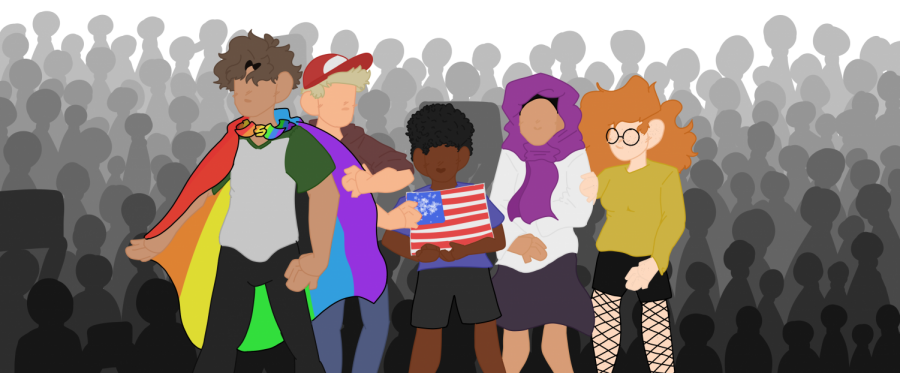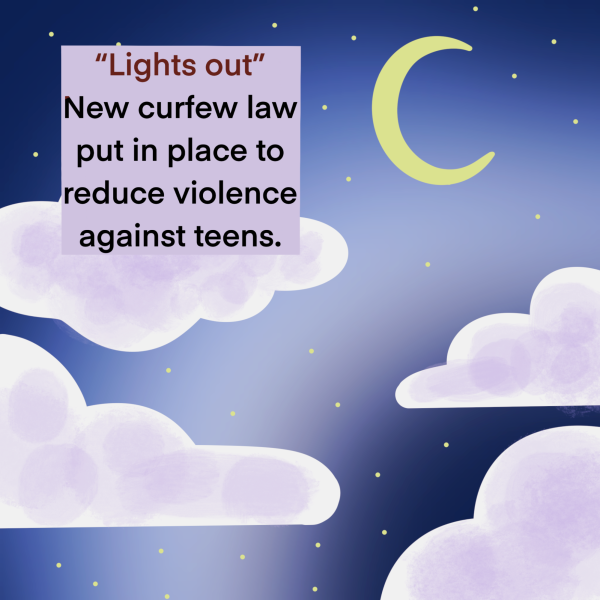Future in the making
With the presidential election just one year away, teens have a stake in today’s most prevalent issues
The future, an unknown realm, depends on the present to make it a safer, brighter place for everyone. An upcoming event that will shape the lives of all Americans is the 2020 presidential election. This event matters to not only those who can vote but also to those who will be affected by the changes it will bring. The path the government chooses to take will have more of an effect on Generation Z, today’s teenagers, and future generations than any other age groups because they will be the ones to face the results of past generations’ actions. The unwanted consequences of past actions can be stopped by teens becoming aware of arising problems in the nation that threaten their safety in the future.
Climate Change
On Oct. 14, Greta Thunberg tweeted, “Again and again, the same message. Listen to the scientists, listen to the scientists. Listen to the scientists!” Thunberg is a 16-year-old climate and environmental activist from Sweden. She has spoken to many people about the emergence of the issue of climate change, such as representatives from the United Nations, the U.S. Congress and former President Barack Obama. Her “Fridays for Future” movement has inspired thousands of school students around the world to go on strike from school and participate in protests that urge adults to take responsibility and help stop climate change.
The evidence of rapid climate change can be seen in hundreds of species going extinct, the warming and acidification of the ocean and the rise of sea level caused by the melting of glaciers. More evidence suggests climate change will and has already disrupted important parts of society, such as human health, agriculture and food security, water supply, transportation, energy and ecosystems.
“As Antarctica melts away, it’s going to have a significant impact on the level of our oceans,” said Jesse Kirkham, chair of the Heartland Group, one of the Sierra Club Hoosier Chapters, in an interview with The Journal. “There is a lot of population that live right on the edge of the ocean and those places are going to suffer more extreme events. Eventually, it’s all going to get flooded and those people will have to move. Cities will get overpopulated by these people trying to migrate like animals to a better place and hopefully survive.”
People now are experiencing harsh weather, including massive wildfires and floods that could greatly affect the economy by lowering the global Gross Domestic Product. For example, the state of California is in great debt and has been pushed to bankruptcy because of increasing destructive wildfires caused by global warming.
According to Kirkham, leaders, political or economic, don’t want to acknowledge the changes that need to be made nationwide in fear of what others might think or the shutdown of many corporations, which will lead to an unlikely reelection or decrease economic growth.
“Understanding that the solutions won’t be perfect and they won’t satisfy everybody but at least start moving in that direction as aggressively as they can, that’s true leadership,” Kirkham said. “(Teens) need to speak out and understand that the goal is to become carbon neutral. It will be very hard to change because so many people’s jobs and lifestyles have depended on this.”
With the substantial amount of study done by scientists, climate change is in fact a real issue for the current and future generations. According to Kirkham, a long process should ideally start now, reversing the effects of human activities on climate change.
Jim Poyser, executive director of Earth Charter Indiana, has helped SHS science teacher Amanda Schnepp with a project for her class. The project was to make her students teach preschoolers at PTEC how they can help the environment by hosting an environmental fair. Using examples like this, Poyser says many people have the power to spread awareness just from talking about it.
“It’s important for teens to get involved because the fact is that young people are having the most powerful role in persuading everyday people in the U.S. to wake up to what’s happening,” Poyser said. “Young people have the intellectual capacities to understand the science, but they have the moral persuasion of their young years to convince adults that they have to look at this issue, and they have to support young people in making the right choices.”
National Debt
Despite the natural skepticism about the American economy, statistics show that it has been doing extremely well over the last couple years. According to the Financial Times, the country’s Gross Domestic Product had grown 1.9% this year, consumer inflation in September was 1.7% and as of October, the unemployment rate had decreased to 3.6%. Despite the percentages reaching these levels, the national debt has been growing to a little over $23 trillion as of this month and shows no sign of stopping.
National debt is debt owed by the federal government, and it is composed of two main parts. Public debt is what the government owes to its citizens, international investors and foreign governments. Intragovernmental debt is what the federal government owes to other government departments, which funds programs like U.S. Social Security and Medicaid. The U.S. government first went into debt after the Revolutionary War and has struggled to control the steady rise of it due to more wars, economic recession, and inflation. However, the country’s debt started to spike significantly under Reagan’s administration. During President Bill Clinton’s time in office, the country achieved an economic surplus, but following Presidents George W. Bush and Barack Obama, the national debt had increased by 100%, from $10 trillion to $20 trillion, due to events like the 2008 financial crisis and raging wars in Iraq and other Middle Eastern countries. In Trump’s presidency, it has increased more than 10%. In addition, the government’s effort to keep the interest rate low is failing. The interest rate has risen to 3.4% and accounts for around $479 billion of the debt.
“The problem of it is now our debt is growing faster than us being able to pay our interest on our debt,” economics teacher Gene Lezon said. “We are not raising enough tax revenues to pay off the number of programs that we consistently add more to. Therefore, our debt is growing faster than it should.”
According to Lezon, the rise of the national debt will affect students in terms of the increasing amount of college tuition and student loans.
“College tuitions have gone up thousands of percent because states are no longer paying (the colleges) as much money as the federal grants were getting decreases…,” Lezon said. “On top of that, they’ve also taken away and raised the percentages on the student loans.”
According to Federal Reserve, the current average of student loan is $32,731 as of early 2019. With the interest rates of student loans rising as well, future generations will be stuck paying for both the national and student loan debt.
To help compensate for national debt, the government must choose which programs, like Social Security programs and disability pensions, Medicaid/Medicare and other healthcare programs or Defense budget expenses, to cut funds from or they must raise taxes. Programs like Social Security and Medicaid are the majority of the public debt. The problem with these solutions are that both will slow the massive growth of the U.S. economy and affect many people benefiting from these programs. According to Lezon, the U.S. government is not making progress in paying the debt in fear of affecting people and consistently adding more programs instead of cutting them.
This generation and future generations will be left to pay for the debt accumulated by the government overspending and the retirement plans of their grandparents without benefiting from the programs themselves.
“Our unwillingness to pay off our debt and to pay off our interest rate is going to put your generation into huge financial problems in the future,” Lezon said. “So the people (baby boomers) who have overspent and my generation who’s done very little to fix it, we have saddled it onto future generations to handle.”
Big Tech
In the age of technology, big tech companies mainly located in Silicon Valley are gaining more power to change the aspect of privacy. These companies, such as Facebook, Google, Amazon and Apple dominate the modern world with products and services that have become prominent in customers’ lives. Technology and well-known companies have become embedded in today’s culture.
According to eMarketer, Google and Facebook together controlled 60% of mobile ad revenue and 51% of digital ad revenue globally in 2018. In the U.S., Apple has about 45% of the smartphone market, and about 47% of all U.S. e-commerce sales go through Amazon.
“Some people have expressed concern over a potential monopoly issue, and they are questioning if we need to break up some of these companies…,” social studies teacher Daniel Jones said. “ Are we in an era where tech is becoming too big?”
For many teenagers today, social media is an outlet they can use to express how they feel and to promote their ideas. But when social media platforms choose to take down a tweet, video or speech they deem as unacceptable, there is an argument that it’s going against the First Amendment.
“Some are asking if it is a problem that we are allowing social media platforms to ban speech they disagree with,” Jones said. “Or do they have the right and the responsibility to suppress speech they find offensive?”
These companies are also storing information on their users simply to make more profit selling them to other businesses. Users are unknowingly allowing their data to be collected and sold without it being illegal by agreeing to the terms and agreements of the services they want to use.
Furthermore, big tech companies could potentially have the power to influence the political process. On July 16, American Institute for Behavioral Research and Technology researcher Dr. Robert Epstein testified before Congress his research on Google’s search engine manipulation effect. He has been studying Google’s search engine results and found that they have the capability to affect the results of an election.
“Research has shown that by manipulating search suggestions, a search engine company can turn a 50-50 split among undecided voters into a 90-10 split with no one knowing they have been manipulated,” Epstein said in his testimony.
His research made him concerned that a search engine company, like Google, can use this method in the 2020 election to promote the candidate they support without leaving a trace of evidence. According to Epstein, this threatens the very democractic values the U.S. stands for, but he sees this as a problem that can be remedied.
“Congress can quickly end Google’s worldwide monopoly by declaring Google’s massive search index, the database the company uses to generate search results, to be a public commons, accessible by all,” Epstein said.
Big tech companies’ goals are to make a lot of things in life more convenient, but Jones is worried if these conveniencies are taken for granted, the companies that have the power to destroy privacy and democracy could get away with these actions.
“If this is going to be part of our culture, young people need to take a role in being informed, active citizens and know how we want to use these platforms moving forward,” Jones said. “We need to know how are we going to alleviate some of the concerns in terms of individual privacy and their own civil liberty.”
Gun Control
In 2017, only three people were killed in shooting incidents in Japan, while around 39,773 people died from gun-related injuries in the U.S. Japan is known for its strict firearms legislation — the U.S. has an amendment to the Constitution defending its citizens’ right to bear arms. A survey conducted by the Pew Research Center showed that 44% of the Americans knew someone who has been shot.
Gun violence has increased over the past couple decades in the U.S. There are more school shootings, suicides by gun and inner city gang violence every single day. Following the Columbine school shooting two decades ago, gun laws today have shown little to no change from gun laws then.
“We’ve seen a failure to act on policies that largely have bipartisan support,” said Hayden Redelman, High School Council Chair of We LIVE Inc. “And sure, we’ve seen assault weapon bans, but we haven’t seen universal background checks. In (Indiana), we haven’t seen regulations on handguns or a state government that’s willing to let municipalities decide what’s best for their communities.”
We LIVE Inc. is a non-profit gun control activist group based in Indiana. They are a youth-led organization and focus on preventing youth violence across the U.S. The organization was started by a group of students in Warren Central High School after they lost two of their fellow classmates to gun violence in May 2017.
According to the Gun Violence Archive, there have been over 33,734 gun-related deaths this year. In addition, there have already been over 90 school shootings that have caused injuries or deaths among the students. Redelman says that the cities that have faced these events have reformed their gun laws. However, the cities that don’t have these issues pay no attention to changing their laws because they can’t imagine these events ever happening in their communities. In order to see real progress, Redelman believes neighborhoods across the country need to take action.
“We have to take a two-prong approach to fixing the gun violence epidemic,” Redelman said. “First thing is reducing the number of guns we have on the streets. Another part of that is building a culture that is sensitive to gun violence, that doesn’t glorify violence or devalues connection and community, because it is a lot harder to hurt someone that you know or care about. This issue is going to become increasingly worse the longer we refuse to take action.”
Across the nation, many organizations have formed for teenagers fearing for their safety in schools. March For Our Lives is a popular nationwide movement demonstrating the need to reduce gun violence. Never Again MSD is a student-led organization that formed after the Parkland high school shooting. These organizations have focused on raising gun control awareness and convincing legislatures to take their side in preventing potential school shootings and creating a safe environment for future generations.
“I think we’ve gotten in this pattern of something terrible happening, a tragedy will happen, and then we start talking about it again, but then it fizzles out,” Redelman said. “We are finally at a point where it’s remaining the national priority, and we need to get people in office who are going to act.”
Hello, people say I am awkward. I guess people also say that I am a sophomore named Phoebe Mawi. Jesus, books, 80’s music, solving math problems, musicals,...






